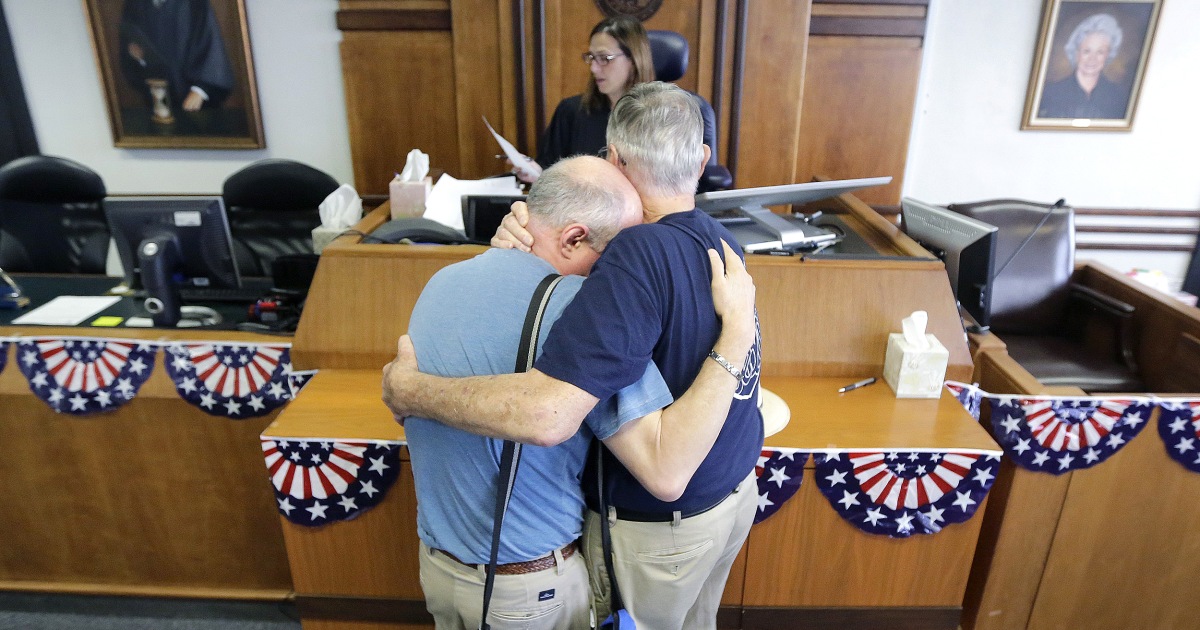
With little more than a week left to the Trump administration, the Department of Health and Human Services has finalized a rule permitting social-service providers that receive government funds to discriminate based on sexual orientation and gender identity.
Critics claim the new guidance could have wide-ranging implications for agencies that address adoption and foster-parenting, as well as homelessness, HIV prevention, elder care and other public services.
“Even as Trump administration officials abandon ship, HHS has announced yet another dangerous rule that invites discrimination against the very people federal grant programs are meant to help,” Sasha Buchert, senior attorney for the LGBTQ civil rights group Lambda Legal, said.
According to the 77-page release, published Tuesday in the Federal Register, Obama-era requirements that agencies refrain from discrimination on the basis of sex, religion, sexual orientation and gender identity and recognize same-sex marriages as legally valid violate the Religious Freedom Restoration Act.
“Given the careful balancing of rights, obligations, and goals in the public-private partnerships in federal grant programs, the Department believes it appropriate to impose only those nondiscrimination requirements required by the Constitution and federal statutes,” the rule states.
Slated to take effect on Feb. 11, the rule change is targeted at child welfare organizations, according to Julie Kruse, director of federal policy for LGBTQ advocacy group Family Equality. Whether private adoption agencies receiving taxpayer money can deny services to same-sex potential parents is at the heart of Fulton v. City of Philadelphia, now before the Supreme Court.
Kruse said both President Donald Trump and Vice President Mike Pence have made allowing discrimination in adoption and foster care a priority over the last four years.
At the National Prayer Breakfast in February 2019, Trump bemoaned that St. Vincent Catholic Charities in Michigan was facing legal action “for living by the values of its Catholic faith” and turning away same-sex prospective parents. The president vowed that his administration was “working to ensure that faith-based adoption agencies are able to help vulnerable children find their forever families, while following their deeply held beliefs.”
That same year, HHS issued a waiver allowing a Protestant foster care agency to turn away Jewish foster parents and stopped data collection on LGBTQ youth in adoption and foster care.
In November 2019, HHS Secretary Alex Azar announced the agency would stop enforcing anti-discrimination protections against federal grantees, prompting a lawsuit by Lambda Legal and Democracy Forward on behalf of the LGBTQ social services groups Family Equality, True Colors United and SAGE. HHS has also ordered recipients of federal funding to accept employees’ religiously based refusals to perform job duties, including denying contraception to women and medical treatment to transgender patients.
According to Kruse, Tuesday’s final rule could also allow a homeless shelter to turn away a queer teen and a senior center to refuse to drive an elderly gay man to his doctor’s appointment. She’s confident it will be overturned by the incoming Biden administration, calling it a “nasty parting shot that won’t stand.” But she admits “it does clog up the works; it does delay protections.”
HHS was among nine federal agencies tasked by the Trump administration to draft guidelines safeguarding “religious freedom,” along with the Departments of Justice, Education, Labor, Agriculture, Housing and Urban Development, Veterans Affairs and Homeland Security and the U.S. Agency for International Development.
Those orders spun out of a White House faith and opportunity initiative launched in 2018 “to remove barriers which have unfairly prevented faith-based organizations from working with or receiving funding from the federal government.”
The Department of Education issued its final rule last September, determining religious universities and student groups were exempt from sex-discrimination statutes in Title iX of the Education Amendments of 1972. Then-Secretary of Education Betsy DeVos stated the change would “protect First Amendment freedoms on campus and the religious liberty of faith-based institutions.”
Dena Sher, associate vice president of public policy at Americans United for Separation of Church and State, called the DoE guidance “discrimination underwritten by tax dollars and tuition fees,” Inside Higher Ed reported.
HHS’s regulation change was announced the same day the Department of Labor’s own final rule took effect, expanding exemptions to Title VII of the Civil Rights Act of 1964 to any contractors — for-profit or nonprofit — who “hold themselves out to the public as carrying out a religious purpose.”
“Religious organizations should not have to fear that acceptance of a federal contract or subcontract will require them to abandon their religious character or identity,” Secretary of Labor Eugene Scalia said in a statement on Dec. 7.
In his LGBTQ policy statement, President-elect Biden promised to reverse the HHS rule “and work to ensure that qualified families are not discriminated against based on sexual orientation, gender identity or expression, sex, marital status, disability, or religion and that child-welfare agencies put the interests of children first, including those who are LGBTQ+.”
And in a statement on Monday, Sen. Ron Wyden, D-Ore., vowed to work with the incoming administration “to restore humanity to HHS.”
“From Day One, the Trump administration has been determined to roll back essential protections for LGBTQ+ Americans, religious minorities and other vulnerable communities,” Wyden, a member of the Senate Finance Committee, stated.
“It’s no surprise that in its last days the Trump administration has delivered a devastating blow to try and permanently greenlight taxpayer-funded discrimination and put the health and well being of children and families across the nation at grave risk,” he added.

